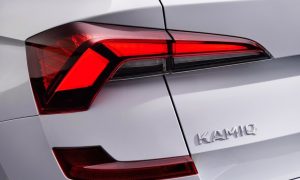
Owners of an Audi e-tron from the 2019 or 2020 model years can now travel farther on a single charge – a new software update will extend their car’s range by up to 12.4 additional miles. This means that Audi isn’t limiting efficiency increases to new models, but also boosting the efficiency of cars already on the road. The update is now available to UK customers and can be installed free of charge at Audi service centres.
Effective immediately, the software features behind this efficiency enhancement expand the usable capacity of the high-voltage battery. As a result, the 95 kWh battery in the Audi e-tron 55 quattro delivers more net usable power – 86 kWh capacity therefore translates into increased range. The software update for all Audi e-tron 55 quattro production vehicles built between mid-September 2018 (model year 2019) and the end of November 2019 (model year 2020) can now be installed free of charge at Audi service partners. In the UK, 1,655 e-tron vehicles are compatible with the update, which will also include a complimentary health check.
In addition to the battery capacity, the new software also optimises the control of the front electric motor. In normal driving mode, the motor attached to the rear axle is responsible for propulsion. For improved efficiency, the front electric motor is now almost completely disconnected and powered off – and only when more power is needed do both motors come into play. This makes it possible to even more effectively exploit the major advantage of the asynchronous motor concept, i.e., currentless operation without electrical drag losses.
Furthermore, the update also improves cooling. The highly flexible thermal management system, which consists of four separate circuits, regulates the temperature of the high-voltage components even more efficiently. Modifying the control system made it possible to reduce the volume flow rates in the coolant circuit, thus reducing energy consumption. The cooling system is the basis for fast DC charging, long battery life, and consistent driving performance, even under high loads.
Excellent suitability for everyday use, excellent sales figures
The first fully electric Audi has been manufactured at our net-zero carbon-neutral site in Brussels since the end of 2018. By this spring, the e-tron had already surpassed 100,000 units sold. In Norway, the model was even the best-selling car across all drive types last year.
Significant growth in deliveries of all-electric Audi models justify the company’s clear move towards e-mobility: by the end of September, Audi had supplied 52,774 all-electric vehicles to customers globally, and therefore achieved an increase of 51.4 percent compared to the same period in the previous year (2020: 34,850). As early as 2026, new models launched to the market by Audi will be all-electric exclusively. In 2033 production of the last models with internal combustion engines will cease.
“At Audi, we deliver progress through technology – and there’s no clearer demonstration of that than the free software and range update we’ve just launched for our existing e-tron 55 quattro customers,” commented Andrew Doyle Director Audi UK. “As we shift our focus to the world of electric vehicles, we’re channelling our pioneering spirit and world-renowned technological expertise into the reinvention of our company as a leading light in the field of sustainable mobility.
“As one of the automotive industry’s first signatories of the Paris Climate Agreement, Audi is taking a holistic and uncompromising approach to meeting its environmental obligations. We have set ourselves ambitious sustainability targets that include the attainment of a 30 per cent reduction in vehicle-specific CO2 emissions throughout the product lifecycle by 2025, operation of all Audi production sites with net zero carbon emissions by that same deadline, and full company-wide carbon neutrality on balance by no later than 2050.”



